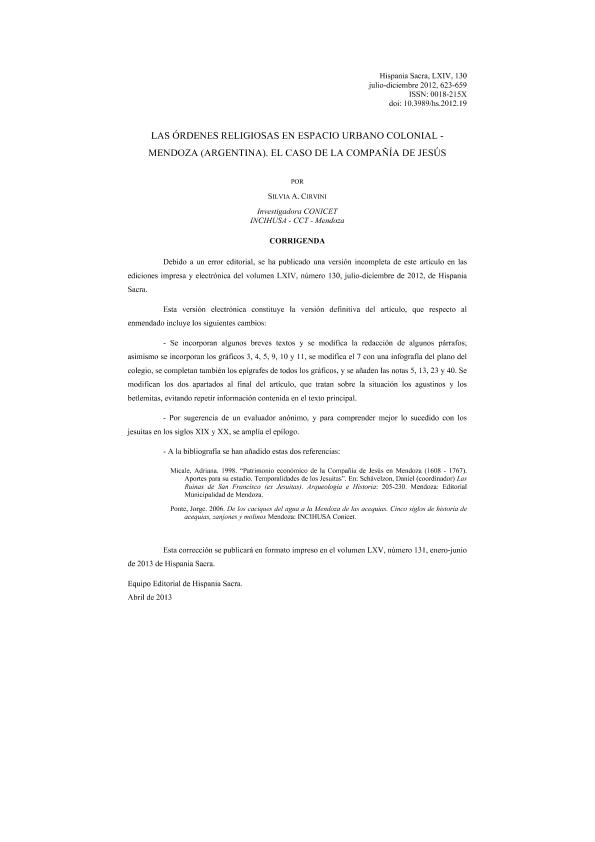Mostrar el registro sencillo del ítem
dc.contributor.author
Cirvini, Silvia Augusta

dc.date.available
2019-02-05T16:13:58Z
dc.date.issued
2012-07
dc.identifier.citation
Cirvini, Silvia Augusta; Las órdenes religiosas en espacio urbano colonial - Mendoza (Argentina): El caso de la Compañía de Jesús; Consejo Superior de Investigaciones Científicas; Hispania Sacra; LXIV; 130; 7-2012; 623-659
dc.identifier.issn
0018-215X
dc.identifier.uri
http://hdl.handle.net/11336/69417
dc.description.abstract
Este artículo propone abordar desde la perspectiva de la historia urbana, la presencia y la acción del clero regular, y en particular la Compañía de Jesús en Mendoza, ciudad periférica del Imperio español en el cono sur latinoamericano. Un recorrido de sus edificios y propiedades, su ubicación espacial en la ciudad, así como las conexiones con otros actores de la vida comunitaria y las otras órdenes religiosas nos permiten reconocer la manera en que la Compañía de Jesús se convirtió en un actor relevante del mundo colonial de Mendoza. Los jesuitas fueron los fundadores del primer colegio y la primera biblioteca pública que tuvo la ciudad, eran proveedores de alimentos básicos como la carne y el trigo ya que poseyeron una eficiente red de establecimientos productivos (haciendas, viñas y molinos) dedicados a la actividad agrícola y ganadera, ubicados no sólo en el oasis del Río Mendoza sino también en el Valle de Uco (oasis del Río Tunuyán).
dc.description.abstract
The purpose of this article is to study the presence and the action of the regular clergy, in particular The Society of Jesus in Mendoza, which was a peripheral city and part of the Spanish empire in South America, from the urban history point of view. We recognize the Society of Jesus as a special and relevant character in Mendocinian colonial times because of the importance of their buildings and properties, their spatial location in the city and their connection with the community and the other members of the regular clergy. The Jesuits were the founders of the first school and the first public library . They were important providers of basic food such as beef and wheat, because they had an efficient network of productive establishments (farms, vineyards and mills) devoted to agricultural and livestock farming. These farms were situated not only in the oasis of Mendoza but also in the Uco Valley (which is the oasis of the Tunuyán river).
dc.format
application/pdf
dc.language.iso
spa
dc.publisher
Consejo Superior de Investigaciones Científicas

dc.rights
info:eu-repo/semantics/openAccess
dc.rights.uri
https://creativecommons.org/licenses/by-nc-sa/2.5/ar/
dc.subject
Ciudad
dc.subject
Colonial
dc.subject
Jesuitas
dc.subject
Órdenes
dc.subject.classification
Historia

dc.subject.classification
Historia y Arqueología

dc.subject.classification
HUMANIDADES

dc.title
Las órdenes religiosas en espacio urbano colonial - Mendoza (Argentina): El caso de la Compañía de Jesús
dc.title
Religious orders in colonial urban space - Mendoza (Argentina): The case of the Society of Jesus
dc.type
info:eu-repo/semantics/article
dc.type
info:ar-repo/semantics/artículo
dc.type
info:eu-repo/semantics/publishedVersion
dc.date.updated
2019-01-23T18:51:09Z
dc.identifier.eissn
1988-4265
dc.journal.volume
LXIV
dc.journal.number
130
dc.journal.pagination
623-659
dc.journal.pais
España

dc.journal.ciudad
Madrid
dc.description.fil
Fil: Cirvini, Silvia Augusta. Consejo Nacional de Investigaciones Científicas y Técnicas. Centro Científico Tecnológico Conicet - Mendoza. Instituto de Ciencias Humanas, Sociales y Ambientales; Argentina
dc.journal.title
Hispania Sacra
dc.relation.alternativeid
info:eu-repo/semantics/altIdentifier/doi/http://dx.doi.org/10.3989/hs.2012.019
dc.relation.alternativeid
info:eu-repo/semantics/altIdentifier/url/http://hispaniasacra.revistas.csic.es/index.php/hispaniasacra/article/view/323
Archivos asociados
